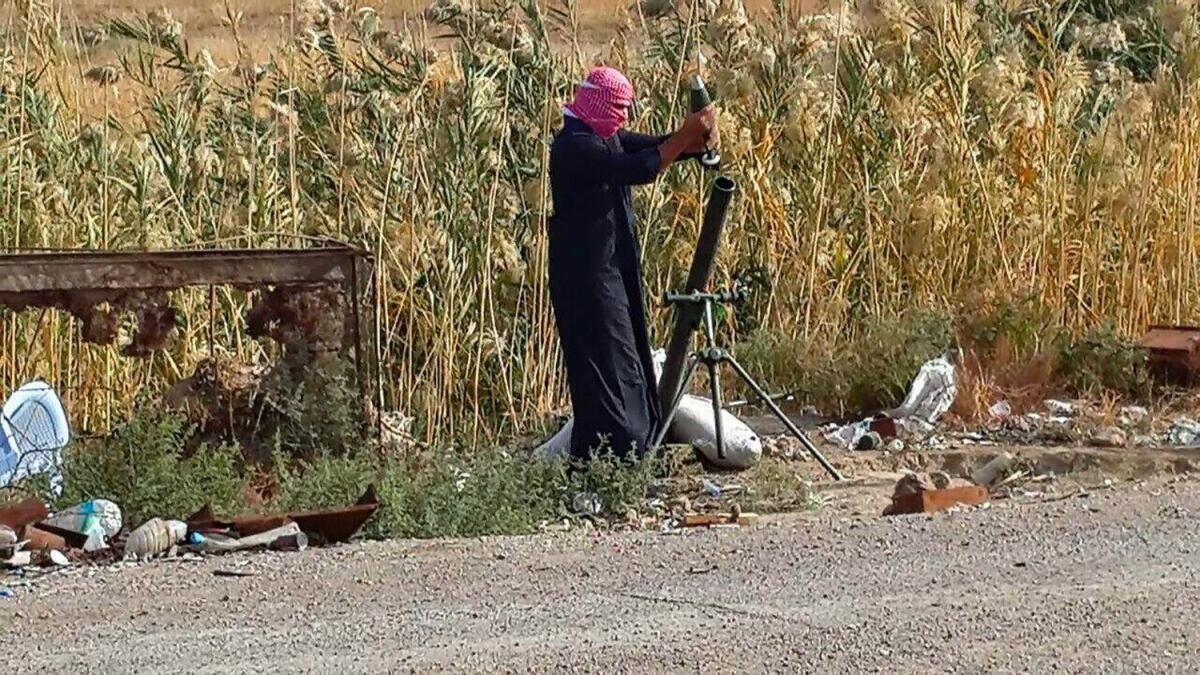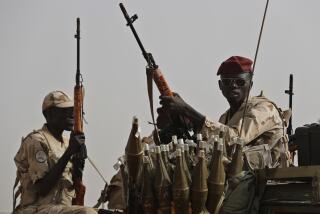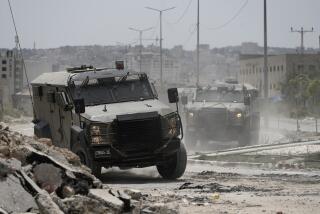Iraqi pro-government forces fight back Islamic State at Ramadi

- Share via
Reporting from Beirut — Iraqi pro-government forces on Saturday repulsed an all-out assault by the militant group Islamic State on the city of Ramadi, capital of western Anbar province, according to official and media accounts.
Al-Iraqiyah, the semi-official state news outlet, quoted Brig. Gen. Kathem Al-Fahdawy, police chief in Anbar, saying, “Security forces supported by tribal fighters repelled the largest attack of Daesh on Ramadi,” referring to Islamic State by its Arabic acronym.
The Islamic State offensive, which began Friday, was described as the militants’ most ambitious effort yet to seize Ramadi, about 60 miles west of the capital, Baghdad. Islamic State has controlled parts of Ramadi and environs for months.
As the battle raged, the head of the Anbar Provincial Council, Sabaah Karhout, telephoned Prime Minister Haider Abadi and the U.S. ambassador in Iraq asking for “urgent reinforcements” and an “intensification” of air sorties, according to press accounts.
Meanwhile, Iraqi news outlets said that pro-government members of the Albu Fahd tribe were on the offensive against Islamic State positions in Sajaariyah, east of Ramadi, where fierce fighting was reported.
Anbar is a vast, largely Sunni Muslim area that stretches from west of Baghdad to the border of Syria. The province is a stronghold of Islamic State, which has declared its “caliphate” across broad sections of Iraq and neighboring Syria.
For months, government forces have held out in central Ramadi against Islamic State attacks.
“The gunmen of Daesh are now demoralized and are going crazy due to the great losses they’ve taken in the province,” Sheikh Faysal Al-Assafi, head of the tribal council of Anbar, said in a statement to Iraq’s Al-Sumariyah News outlet.
The tribal leader also criticized what he called the role of the U.S.-led coalition, calling it “weak and very elementary” and demonstrating a “lack of seriousness” in the fight against the Islamic State. The United States and its allies have been conducting airstrikes for months against militant positions in Iraq and Syria.
During the U.S.-led invasion of Iraq in 2003 and occupation through 2011, Ramadi and nearby Falluja were hubs of the Sunni-led insurgency against the Washington-backed central government in Baghdad. U.S. forces finally managed to win alliances with some Sunni tribes, and put tribal fighters on the U.S. payroll to battle Al Qaeda-linked militants.
But many Anbar residents remained hostile to the Shiite-led government in Baghdad and welcomed the Islamic State, a group that claims to champion the Sunni cause. Still, the militants have not spared their Sunni adversaries.
This month, Islamic State massacred hundreds of members of the Albu Nimr tribe in Anbar province, including women and children. Images circulated on the Internet depicted corpses lined up in neat rows on the pavement, blood seeping from fresh head wounds.
Elsewhere in Anbar province, Al-Iraqiyah reported that airstrikes Saturday killed scores of militants in the Iraqi city of Hit, 30 miles west of Ramadi. Islamic State fighters overran Hit in October, forcing pro-government forces to retreat.
It was unclear if the U.S.-led coalition or the Iraqi air force was behind the reported aerial bombardment. The Associated Press cited local residents saying that a number of civilians, including a family of four, were killed in an airstrike Saturday in Hit.
Bulos is a special correspondent.
Twitter: @mcdneville
More to Read
Sign up for Essential California
The most important California stories and recommendations in your inbox every morning.
You may occasionally receive promotional content from the Los Angeles Times.








